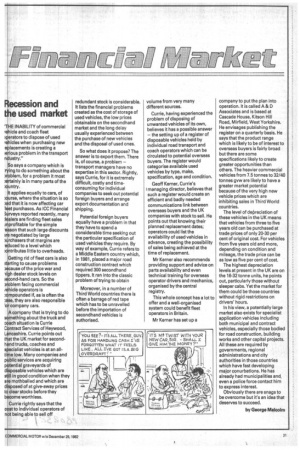Recession and the used market
Page 31

If you've noticed an error in this article please click here to report it so we can fix it.
THE INABILITY of commercial ashicle and coach fleet perators to dispose of used %%hides when purchasing new eplacements is creating a erious problem in the transport ndustry."
So says a company which is rying to do something about the )roblem, for a problem it most :ertainly is in many parts of the aountry.
It applies equally to cars, of :curse, where the situation is so )ad that it is now affecting car lest purchases. As ICC Financial iurveys reported recently, many lealers are finding fleet sales Jnprofitable for the simple eason that such large discounts ra negotiated by large )urchasers that margins are educed to a level which :ontributes little to overheads.
Getting rid of fleet cars is also ;tarting to cause problems )ecause of the price war and ugh dealer stock levels on micond-hand cars. So the )roblem facing commercial tehicle operators is lompounded if, as is often the .lase, they are also responsible or company cars.
A company that is trying to do something about the truck and coach situation is Currie contract Services of Heywood, Lancashire. Currie points out that the UK market for secondhand trucks, coaches and specialist vehicles is at an alltime low. Many companies and public services are acquiring potential graveyards of disposable vehicles which are still in good condition when they ape mothballed and which are disposed of at give-away prices tc clear stocks before they become worthless.
Currie rightly says that the cost to individual operators of not being able to sell off redundant stock is considerable. It lists the financial problems created as the cost of storage of used vehicles, the low prices obtainable on the secondhand market and the long delay usually experienced between the purchase of new vehicles and the disposal of used ones.
So what does it propose? The answer is to export them. There is, of course, a problem — transport managers have no expertise in this sector. Rightly, says Currie, for it is extremely difficult, costly and timeconsuming for individual companies to seek out potential foreign buyers and arrange export documentation and shipping.
Potential foreign buyers equally have a problem in that they have to spend a considerable time seeking out the particular specification of used vehicles they require. By way of example, Currie refers to a Middle Eastern country which, in 1981, placed a major road construction contract which required 300 secondhand tippers. It ran into the classic problem of trying to obtain Moreover, in a number of Third World countries there is often a barrage of red tape which has to be unravelled before the importation of secondhand vehicles is authorised.


































